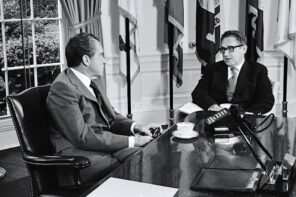The accusation that Israeli policies in the territories occupied after the ’67 War resemble South African apartheid has been a flash point in both national and international debates. A more radical and harsher claim is that a kind of apartheid exists within the state of Israel, a nation in which close to twenty percent of the citizenry is Arab. This claim about Israel was a major factor in the U.N. decision of 1975 to declare Zionism a form of racism, a decision that was eventually rescinded under pressure from the United States. In the U.S., the publication of Jimmy Carter’s 2007 book Palestine: Peace Not Apartheid, which makes the first claim but not the second, caused an irreparable break between the former president and the leadership of American Jewish organizations.
Within Israel the use of the “A-word” has a venerable history and had been associated with critiques from the Jewish and Arab left. But in the past decade, as some figures in the Israeli government sought a solution to the problems caused by the prolonged occupation, they too began to refer to South African apartheid, for the most part in a predictive manner. That it is to say: Israel may not yet be practicing apartheid—but it is approaching it. In 2007, then-Prime Minister Ehud Olmert called for negotiations that would lead to a two-state solution. He warned his countrymen that in the future Israel would “face a South African-style struggle for equal voting rights, and as soon as that happens, the State of Israel is finished.”
Clearly, making a comparison between Israeli policies and these of apartheid-era South Africa is an incendiary charge in both the United States and Israel. In Europe it is more commonly heard. The claim will make you a lot of enemies on the political Right, and earn you points on the international Left.
Israel allied with South Africa
The Unspoken Alliance is not directly concerned with the Israel-South Africa comparison, but it cannot, of course, avoid it. Rather, writer Sasha Polakow-Suransky, a senior editor at Foreign Affairs, seeks to “document the development and demise of an extensive and lucrative military alliance” between Israel and South Africa. As he describes it, “This alliance flourished for the twenty years between the aftermath of the 1973 War and the end of the apartheid regime in 1993.” Rather then give us the whole story of the alliance at the outset the author lets us follow the development of this military, economic and political relationship. When we reach the end of the book the larger picture emerges. “The total military relationship between the two countries amounted to more than ten billion dollars over the course of twenty years.”
On the Israeli side, the alliance with South Africa was fostered by Shimon Peres, Yitzhak Rabin, and Moshe Dayan, three men who often fought among themselves, but who were united in shaping a new Israeli foreign policy after the 1973 War. In Polakow-Suransky’s analysis this unlikely troika
“saw Israel’s security as paramount and they were willing to make moral compromises in order to ensure it. It was precisely this worldview that gave birth to the alliance with South Africa.”
The author contrasts this worldview with an earlier “moral” perspective espoused by Prime Minister Golda Meir, who had also served as Foreign Minister. In August of 1963, Meir spoke to the UN General Assembly about Israel’s foreign policy. “We naturally oppose policies of apartheid, colonialism, and racial or religious discrimination wherever they exist.”
Obama’s first political speech: divest!
Throughout the book Polakow-Suransky contrasts the “moral” stance of Meir and other early leaders of the young Israeli state with the cynical pragmatism and “hypocrisy” of its post 1973 leadership. In my opinion this is a somewhat naïve dichotomy—one that derives from reliance on Meir’s own autobiography, which naturally portrays her in the best light.
The author brings to life the period in the early 1980s when the call for divestment from South Africa was a feature of American campus life. Activists of the eighties focused on bringing down the Apartheid regime with an intensity similar to the passion they brought to ending the Vietnam War and supporting the Civil Rights movement in the 1960s. Among the many gems that the author uncovered is this gem from the files of the LA Times: “A nineteen-year-old Barack Obama gave his first political speech in February 1981, urging the trustees of Occidental College in Los Angeles to divest from South Africa.”
The most newsworthy of the book’s findings is the claim that in March of 1975 the “Israeli defense officials offered to sell South Africa some of the nuclear-capable Jericho missiles in its arsenal.” That specific deal never went through, but it “was only the beginning of Israeli-South African Cooperation on nuclear missile technology…” When Polakow-Suransky published an article on this subject in The Guardian, the Israeli government heatedly denied the allegations.
In the light of the sharp rightward turn of American Jewish organizations, especially in relation to Israel, it is very instructive to learn that this turn is not as recent as one might think. By the early 1980s the Anti-Defamation League of the B’nai B’rith had targeted the ANC and its supporters on the left as “anti-democratic, anti-Israel, and anti-American.” Thus before long the “War on Terror” and the American invasions of Iraq and Afghanistan, ‘democratic,’ ‘American,’ and ‘Israeli’ were, in the lexicon of the ADL, three synonymous terms.
To return to another contested lexical item, the dreaded “A (for Apartheid) Word,” Polakow-Suransky devotes the book’s epilogue to the Israel-South Africa comparison. He acknowledges that the Israel-South Africa “apartheid analogy is an imperfect one… Unlike white South Africa and other colonial regimes, Zionists never banned miscegenation or kept the people they had conquered as servants in their homes.”
But he concludes with a dire warning:
“the apartheid analogy may be inexact today, but it won’t be forever. The Palestinian population is expanding faster than the Jewish one and Israel’s days of declaring itself both a Jewish State and a democratic one are numbered… By failing to heed the lesson of South Africa’s demise, Israel risks remaking itself in the image of the old apartheid state.”




